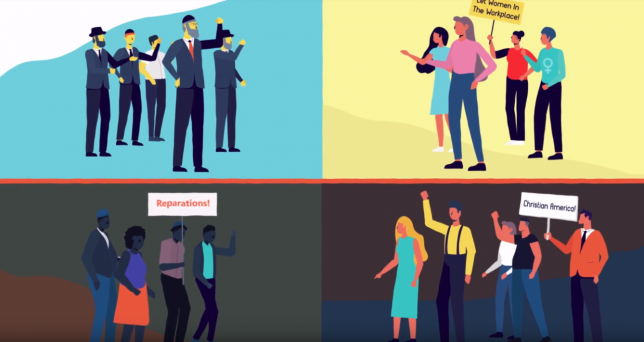Featured Items
Featured Op-Ed: Why Does YouTube Think MLK’s Views are Supremacist?


This op-ed was originally featured on the Washington Examiner — dated December 15, 2017
Last week, YouTube restricted access to a Capital Research Center video, apparently for the dangerous idea it promotes: The universal brotherhood and sisterhood of mankind.
The video, which I wrote, produced, and narrated, was placed in “limited content mode,” blocking it from view in the United Kingdom and 27 other countries.
In the countries where it could still be viewed — such as the U.S. — the video is locked behind a warning message. It cannot attract likes or comments. Advertising on it is forbidden. The Google-owned YouTube blacklists videos like mine after manual review if they are confirmed to contain “inflammatory religious or supremacist content.” So, what monstrosity could I have possibly created?
You can see it for yourself here:
The video is called “Right-Wing or Left-Wing, Identity Politics is Destroying America.” It’s a nonpartisan critique of the identity politics driving liberals and conservatives even further apart. In three minutes, the video makes the case that we ought to judge people not by the color of their skin, but the content of their character. I’m parroting Martin Luther King Jr. for a reason: Twenty seconds of run time is devoted to an unaltered clip from King’s “I Have a Dream” speech.
Throughout the video, I criticize identity politics on both ends of the political spectrum, from college activists to alt-right Internet trolls. Despite my attempts to remain nonpartisan, I am a libertarian working at the right-leaning Capital Research Center, and it’s likely my bias is detectable. And this fits a growing trend of center-right videos being placed in “limited content mode” or otherwise restricted.
PragerU has already sued YouTube, claiming at least 37 of its videos continue to be censored without any good reason. Other content creators — including classical liberal talk show host Dave Rubin and conservative comedian Steven Crowder — have also been affected.
But my experience is an unprecedented one. This is not a case of conservative content on religion or immigration being censored for contradicting Silicon Valley’s worldview. This is a case of content directly opposing supremacist ideology being blacklisted as “supremacist” by the most powerful technology company in the world.
Google has a history of left-wing identitarian bias, as demonstrated by the firing of engineer James Damore for his now-famous memo opposing identity politics in Google’s hiring practices. But censoring Martin Luther King Jr. is a new low.
In certain corners of the Left, to be opposed to “identity politics” is equivalent to opposing “social justice.” Even in King’s time, the Nation of Islam represented this view. But now that King’s views represent the American mainstream, many on the Left believe the fight for progress on social justice means moving ever-leftward to where the identitarians rule. It’s impossible to achieve King’s dream of an inclusive society, where we judge people solely by the content of their character, without rejecting identity politics.
Our increasingly polarized America has created a culture where many of us are more sympathetic to the radicals on our side than the moderates on the other. It happens on both sides: Well-meaning conservatives, for example, mistakenly accepting false news stories about immigration originated by xenophobic radicals. Confirmation bias is a powerful force.
Google seems to have fallen into this trap. The company apparently assumed that, as a libertarian at the Capital Research Center, I’m an ardent right-winger whose mission is to attack marginalized groups. In fact, as someone who grew up on the Left and only converted to libertarianism as an adult, I simply sought to stand up for a view I’ve maintained while on both sides.
Today’s most divisive political echo chambers are built on the tribal assumptions of identity politics. Let’s dissolve them with conversation, not reinforce them with censorship.
This story has a strange ending. On Tuesday, Dec. 12th, YouTube quietly reinstated the video without contacting or notifying me in any way. The restrictions were simply gone.
This occurred after Fox News contacted Google for comment on a story they were preparing about what happened. Google claimed the restriction was placed in error. Yet, the video underwent manual review twice before Fox News reached out, making an error highly unlikely.



